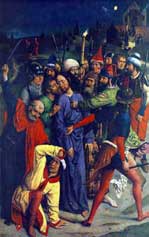
Jesus' Character
by Deborah Beach Giordano
What Happened?
This is quite a passage; it certainly turns our Sunday School image of “Jesus, meek and mild” on its head.
The Lord is kicking up a ruckus; shouting at people, scattering money across the floor, knocking over tables, and using a whip to drive the sheep and cattle out of the temple.
What would the Humane Society say?
And what about us? What can we say about a “good shepherd,” who does things like that?
Along the River
We can say, as the disciples seem to have done amongst themselves, that Jesus was compelled to do these things out of his deep concern over the situation at the temple and in accordance with the scriptures. But that sounds suspiciously like an excuse; a rationale to justify why something that shouldn’t have happened — did.
“Something drove him to it,” “He was never like that.” “It was completely out of character.” “He was always such a pleasant fellow.” As our 12-step friends are so fond of saying: Denial isn’t only a river in Egypt.

In John’s gospel in particular Jesus is depicted as calm, cool, and full of quiet confidence in every aspect of his ministry, from its beginning on through Calvary. Yet here, in a very public forum, we see a very different kind of behavior.
Hands On
Whether we are comfortable with the fact or not, Jesus was clearly capable of strong emotions — of passion, in fact; of outrage, anger, grief, pity, longing, love.... He is Jesus the Christ, not Casper the Milquetoast.
Our Lord didn’t walk around gazing at the distant heavens, a blissful, otherworldly smile upon his face, palms pressed together in fervent prayer ... Jesus was a true “hands on” Savior who reached out to those in need. He healed the suffering, fed the hungry, embraced the forsaken, comforted the sorrowing, and forgave the repentant. And — when the situation demanded it — Jesus stood up to the hateful, the hurtful, the cruel, and the thoughtless.
A Real Stand-up Guy
 The Lord stood up to wrongdoers, but he never lowered himself to using their methods.
The Lord stood up to wrongdoers, but he never lowered himself to using their methods.
Though slandered, imprisoned and abused, Jesus did not summon armies of angels — or hordes of Galilean peasants — to avenge his mistreatment. He simply (!!) refused to give in: even in the shadow of the cross Jesus stayed firm in his insistence that God’s mercy, love and forgiveness were freely given, and could not be controlled, contained, or bought.
Unfailingly, unflinchingly, despite the most horrible suffering and agonizing death, Jesus’ faith remained strong and certain. To the end of his earthly ministry and beyond, our Lord proclaimed the Good News: courage is stronger than fear, love is stronger than hate, life is stronger than death. God always has the last word.
The Wingman
Jesus deserves to be remembered as he truly was — and we desperately need to know the Lord in the depth and variety of His incarnation: not as an idealized innocent, incapable of saying “boo” to a mouse, but as an inspiring leader; an unstoppable, fearless guide who remains with us, unfailingly, wherever we go.

There are times when we need a Shepherd who is kind and gentle; a retriever and comforter of lost lambs who shelters us from the storm. And sometimes we need — as one of my directees describes it — a “wingman”: a strong, stand-up Buddy who accompanies us through the deepest pits of hell, through the smoke and horrors and blackness, the emptiness and the desperate terror — and emerges, unshaken. This Jesus “has our back,” and we have no cause for fear.
Sometimes we need Christ the Champion; the one who ordered the moneychangers out of the temple, who stood fast when all his friends deserted him, who endured slurs and scorn, who suffered pain and heartache, and never wavered in his faith. Despite everything, Jesus stayed strong and true to God. With Him beside us we know that we, too, will overcome every obstacle: through Jesus Christ our Lord not even death itself can hold us.
Virtual hugs and real-time blessings,
Deborah +
This Week's Suggested Spiritual Exercise
Imagine Jesus.